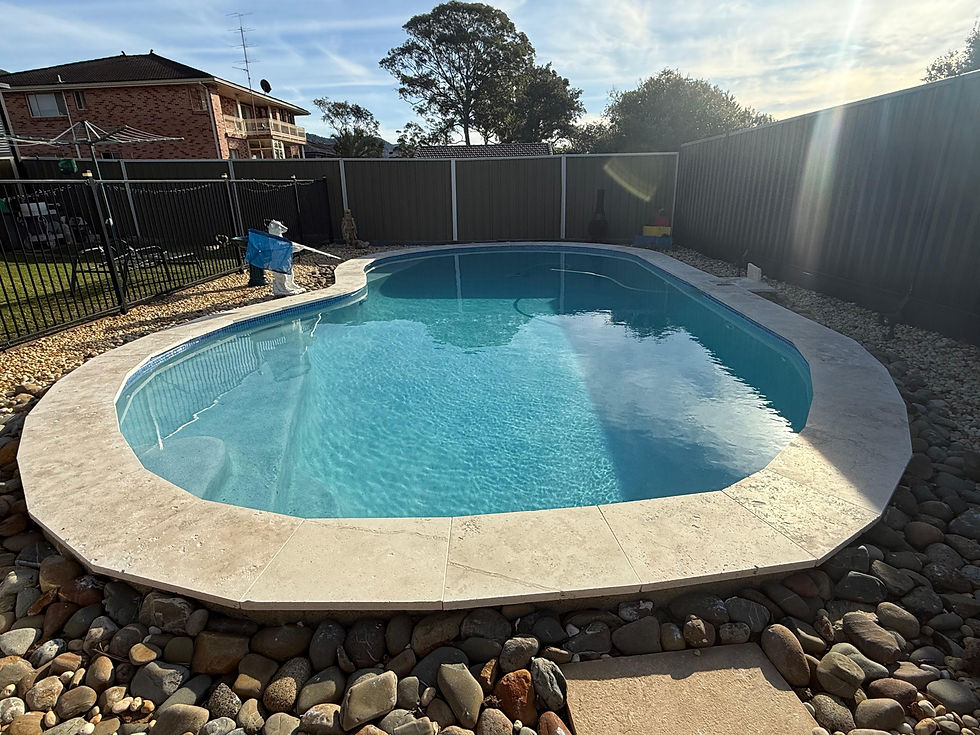Why choose Fibreglass to resurface your swimming pool?
- Splash Pool & Spa Australia PTY LTD

- Mar 31
- 3 min read
Updated: Mar 31

Choosing fiberglass to resurface your swimming pool offers several benefits that can make it an excellent choice for many pool owners. Here are the key advantages of fiberglass resurfacing:
1. Durability
Long-lasting: Fiberglass is highly durable and can withstand the elements for many years without deteriorating. It resists cracking, chipping, and fading better than other materials like plaster or concrete.
Low Maintenance: Once applied, fiberglass surfaces require minimal upkeep compared to traditional plaster or concrete pools. It doesn’t absorb oils, dirt, or other debris, making it easier to clean and maintain.
2. Smooth, Non-Porous Surface
Comfortable to Swim In: Fiberglass surfaces are smooth to the touch, which means swimmers won’t experience the rough, abrasive texture often found in older plaster pools.
Resistant to Algae Growth: The non-porous surface of fiberglass reduces the likelihood of algae and bacteria buildup, making it much easier to maintain clean, clear water. Algae can’t easily cling to the surface, so you'll spend less time scrubbing and more time enjoying the pool.
3. Faster Installation
Quick Resurfacing Process: Fiberglass resurfacing is generally quicker than other methods. While plaster or concrete resurfacing may take weeks to cure, fiberglass can be installed in just a few days, allowing you to get back to using your pool sooner.
Less Downtime: Since fiberglass surfaces are often pre-fabricated and custom-fitted to your pool, they are easier and faster to install compared to the traditional process of mixing and applying plaster or concrete.
4. Chemical Resistance
Fiberglass pools are highly resistant to chemical damage, including chlorine and salt. This means they can handle high levels of pool chemicals without deteriorating or discoloring over time. You’ll spend less on chemicals and can maintain more consistent water balance.
5. Aesthetic Appeal
Modern, Sleek Finish: Fiberglass comes in a range of colors and finishes, allowing you to achieve a modern and attractive look for your pool. You can choose from a variety of gel coat finishes, giving your pool a shiny, beautiful appearance that’s easy to clean.
Stain-Resistant: The smooth surface of fiberglass makes it highly resistant to staining from minerals, chemicals, and algae, keeping your pool looking clean and fresh for longer.
6. Energy Efficiency
Better Insulation: Fiberglass surfaces have natural insulating properties, which can help keep the water temperature warmer for longer periods. This can be especially beneficial if you use a pool heater, as the insulation reduces heat loss and can make heating more energy-efficient.
7. Cost-Effective in the Long Run
While fiberglass resurfacing may be more expensive upfront compared to plaster, its long-term benefits can make it more cost-effective. With its durability and low maintenance, you’ll save on repair and maintenance costs over the years.
Reduced Water Loss: Since fiberglass is highly resistant to cracking, you’re less likely to face issues with water loss through leaks, which can happen with older plaster or concrete surfaces. This can save you money on water bills.
8. Environmentally Friendly
Eco-Friendly Option: Fiberglass is a more environmentally friendly option compared to other pool finishes. It doesn’t require harsh chemicals for cleaning and maintenance, and the production process has less impact on the environment than concrete or plaster.
Recyclability: Many fiberglass materials are recyclable, making it a more sustainable option if you decide to replace or upgrade the pool surface in the future.
9. Flexibility
Suitable for Various Pool Shapes: Fiberglass can be used on a wide range of pool shapes and sizes. Whether you have a simple rectangular pool or a more intricate custom design, fiberglass can adapt and provide a smooth, seamless surface that fits your pool perfectly.
10. Increased Property Value
A beautifully resurfaced fiberglass pool can enhance the aesthetic appeal of your property and potentially increase its value. Homes with well-maintained, modern pools are often seen as more desirable, which could help you attract potential buyers if you decide to sell.
Potential Drawbacks of Fiberglass Resurfacing:
While fiberglass offers many advantages, it may not be suitable for everyone. Some potential drawbacks to consider include:
Initial Cost: The upfront cost of fiberglass resurfacing can be higher compared to plaster or paint options.
Limited Design Options: While fiberglass offers many color choices, it doesn’t have the flexibility of concrete in terms of custom finishes or intricate designs.
Can’t Refinish as Often: Once fiberglass is applied, it's difficult to change the texture or appearance, unlike plaster, which can be refinished multiple times.
Conclusion:
Fiberglass is an excellent choice for resurfacing a pool, especially if you want durability, low maintenance, and a beautiful, long-lasting finish. It’s particularly well-suited for those looking for a hassle-free experience, with minimal chemical issues, fewer repairs, and an attractive finish that will last for many years. If you're looking to upgrade your pool to a more efficient, aesthetically pleasing, and durable option, fiberglass resurfacing is a solid investment.






Comments